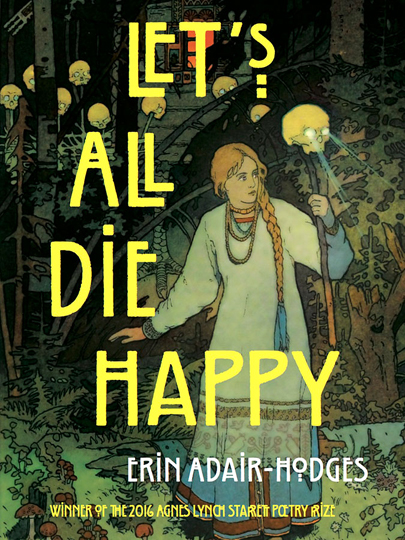The ultimate deadline — that’s what spurred Erin Adair-Hodges to get tapping on the keyboard.
“I’d kept intending to write poetry again only to realize one day in my late 30s that ‘one day’ had probably already passed and that my chance to create is finite,” she said. “This is true for all of us, it’s part of the mortal bargain, but knowing this intellectually and knowing this with your whole soul is pretty different.
 “I kept waiting for someone to tell me it was OK to take myself and my work seriously, but it was understanding that no one would do so which actually allowed me to make the commitment to poetry.”
“I kept waiting for someone to tell me it was OK to take myself and my work seriously, but it was understanding that no one would do so which actually allowed me to make the commitment to poetry.”
Making that promise led to her debut, “Let’s All Die Happy,” which was released last week. The 112-page book is part of the Pitt Poetry Series published by the University of Pittsburgh Press.
The title is the first line of the poem, “Everybody in the Car We Are Leaving Without You.”
“Titling a book is a fairly soul-crushing process,” Adair-Hodges said. “It has provoked strong reactions — love or hate … But, ultimately, I think it’s an honest presentation of the tone and concerns of the collection.”
Through witty, spot-on observations infused with cerebral pop culture references, the UT visiting assistant professor of creative writing shares her perspective on being a woman. Titles of poems include “American Idyll,” “Ode to My Dishwasher,” “Self-Portrait as Banshee,” “The Mammogram” and “I Would Have Listened to Rush.”
“Many of us, especially women, are taught that adherence to certain conventions will provide us with meaning and fulfillment — the idea that if we do what we’re supposed to, believe what we’re told, we will be happy. I believed this for a long time until the evidence of my life could no longer support that,” Adair-Hodges said.
“Breaking from what we’ve been inculcated with frees us to find the truest versions of ourselves, but it can also leave us without the security that these kinds of institutions provide. It can be scary, this figuring out of what’s next and why. This has been part of my own personal, intellectual, emotional and spiritual path, one that I’m still on and using art to sort out.”After receiving a master of fine arts degree from the University of Arizona, Adair-Hodges shelved poetry — for eight years. She was the arts editor of a weekly paper for a while, taught writing, and started a family. After her son was born, the allure of words beckoned.
“At the newspaper, I wrote hundreds of pieces — criticism, profiles, reviews and more — all of which sharpened my attention to language and precision,” she said. “Teaching writing required I be able to articulate and provide evidence for my instruction and insight. All of this provided me with the tools to express the vision of my work I’d been carrying around inside me for years.”
The native of New Mexico recently had her work featured on “PBS NewsHour” and took home the 2016 Agnes Lynch Starrett Poetry Prize for “Let’s All Die Happy.”
“I think now as much as ever, we need to heed women’s stories. The work may resonate with some while challenging the imagination or empathy of others, but I believe it has value if for no other reason than it’s an honest expression of my experience in the world.”
That candor comes with comedy.
“As a poet, I use humor to engage, to get closer to the matter,” Adair-Hodges said. “Humor, to me, is a way to honesty, a path that must necessarily cut through some darkness.”
She will read from and sign “Let’s All Die Happy” Thursday, Nov. 2, at 6 p.m. in Libbey Hall. Books will be available at the free, public event sponsored by the UT Department of English Language and Literature. Purchases also can be made at online book retailers and the author’s website, erinmolly.com.
“I think we’re all drawn to poetic expression, the translation of our experiences into art, into something that connects to others,” Adair-Hodges said. “Poetry is only as hard to understand as life is, so I think if you’re inclined to work through some of life’s mysteries and truths, you’ll find value in poetry — often, it’s just a matter of finding the work that speaks to you.”